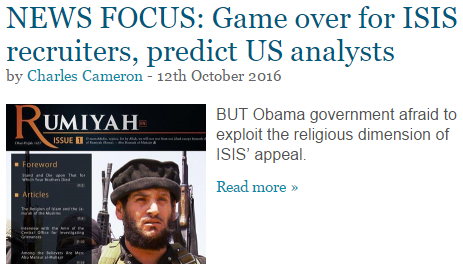And another next, 26, mixed
Friday, March 22nd, 2019[ by Charles Cameron — running the gamut from Mike Pompeo a flailing, failing theologian, to ISIS, not that their theology is so great, ahem, but still around, with cat-herding visible unto the days of the grandkids ]
.
Credo quia absurdum? Or, getting the original quote right, credibile est, quia ineptum est? That’s no inept as to be believable?
There’s actually a passage in Cicero’s Rhetoric for Herrennius that describes how to make objects of contemplation more memorable by choosing the most beautiful or ugly images as analogs / analogies to represent them:
We ought, then, to set up images of a kind that can adhere longest in memory. And we shall do so if we establish similitudes as striking as possible; if we set up images that are not many or vague but active; if we assign to them exceptional beauty or singular ugliness; if we ornament some of them, as with crowns or purple cloaks, so that the similitude may be more distinct to us; or if we somehow disfigure them, as by introducing one stained with blood or soiled with mud and smeared with red paint, so that its form is more striking, or by assigning certain comic effects to our images, for that, too, will ensure our remembering them more readily.
It may be that Tertullian — the Church Father who authored that phrase about believing something because it’s so incredible — was not so far in his thinking from Cicero — was accustomed to at least the concept of using the strangest, most strained analogies, and applied it to his contemplation of the unspeakable, unimaginable Godhead, since such disfigured analogies are both the most memorable and the least likely to be taken literally, and thus mistaken for the Reality to which they are intended to point.. but that’s pure speculation on my part.
But I’m sorry, No. Mike Pompeo may have been first in his class at Annapolis, and I may have been far from first in my class at Oxford, but at least my studies were in Theology — and No.
**
Here’s one for the liminal collection:
An island, you know, is something else. In a continent, the watersheds are important natural divisions, as are linguistic groupings and cultures. There’s arguably a cultural component of Brit-oriented Northern Irish, and they’re not enemy — but the naturalness of a united island Ireland seems pretty clear.
Islands:
History has time and again highlighted the importance of islands in establishing naval dominance.
That’s from Darshana Baruah, SISTER ISLANDS IN THE INDIAN OCEAN REGION: LINKING THE ANDAMAN AND NICOBAR ISLANDS TO LA RÉUNION
Through a ring of bases and naval presence on islands, the British essentially controlled the entry points into this crucial area. In the east it had Singapore and the Andaman and Nicobar Islands, while Socotra and the port city of Aden provided access to the Red Sea and Bab-el Mandeb. With control of Sri Lanka, Maldives, Mauritius, the Seychelles and, briefly, Madagascar, the empire turned the Indian Ocean into a “British Lake.” To consolidate its presence along the coast of Africa, the British Empire fought bloody wars to take control of Kenya, Uganda, and the island of Zanzibar. With these islands and coastal territories, the empire projected its power across the region and dominated the key chokepoints and shipping lines between Asia, Africa, and Europe.
Bloody, note the bloody. And dominance, note the British dominance. I’m not sure that bloody dominance is quite so well-supported any more, but a little less Biriths dominance and Ireland might be a little less bloody.
**
Dan Nexon recommends a paper featuring an arc — yes, we’re collecting arcs — but not the MLK moral arc that may be long, but in the end “bends toward justice”..
If you want to be freaked out, read accounts of the arc of fascist and right-wing illiberal movements from the 1920s to 1930s. For a quick overview that feels uncomfortably familiar, see https://t.co/dBHiDKezGw
— Dan Nexon (@dhnexon) March 22, 2019
**
JM Berger has been interviewed by Terry Gross — to be aired on Monday:
Stay tuned!
**
All In, Chris Hayes:
Unh.
They’re [WH] basically blowing off a co-equal branch of government which gives a strong indication of how they plan to back-rush their way through anything damning from the Mueller report, when it comes.
In fact, there is such a swarm of criminality, prosecutions and pleas around the President and his ever-moving dynamic vortex..
A trial run, a warm-up inning..
Y’know, Mueller report ridiculous, but I want to see it is vaguely reminiscent of credo quia absurdum, or th more accurate quote in my own translation, see above:
That’s no inept as to be believable
**
I can’t find the Jon Meacham quote on ceremonial trolling, so here’s one from India:
Rohit is to this series what trial ball is to gully cricket
Twitter went ahead with its ceremonial trolling of Rohit soon after he was dismissed. It’s become a routine of late for the right-hander to perish cheaply and be the butt of jokes on social media.
At least it’s a fun replacement, though for seriosity I’d have preferred the Meacham.
**
Mr. President, seriously stop talking about Senator McCain.
— Rep. Dan Crenshaw (@RepDanCrenshaw) March 21, 2019
and btw:
Religion is a bedrock for a moral society, because it shows us that morality is absolute, not relative or subject to popular cultural whims.
Religious people are far more likely to give to charity/volunteer than the non-religious, and give more as % of income.
— Dan Crenshaw (@DanCrenshawTX) March 17, 2019
**
D’oh.
**
Clint Watts @selectedwisdom:
I really would like everyone to read that story ..
The whole idea is, everybody around the world knows that you can hire companies to crack into any one of these endpoints —
— and go through any of these communications ..
If you want to feel your communications are safe, don’t worry about government surveillance, worry about corporate guys-for-hire that are hired by all these companies ..
Here’s the article:
A New Age of Warfare: How Internet Mercenaries Do Battle for Authoritarian Governments
BTW another Clint quote from my day’s scan:
If we were to go after Wikileaks, it could lead to massive information dumps of US secrets around the world ..
In have the feeling I quoted an abbreviated version a while back, without that crucial “of US secrets” — good to have thee full version, in any case.
**
Sigh:
Charles Lister, Trump Says ISIS Is Defeated. Reality Says Otherwise.
The ISIS of the future could be just as bad if not bigger and worse than the one we watched dramatically expand in 2014. In Iraq, nearly 20,000 ISIS detainees currently lie in prison and tens of thousands more who are accused of having maintained ties to ISIS lie in squalid camps surrounded by hostile security forces. A further 20,000 Iraqi ISIS prisoners and family members currently in Syria look set to be transferred back to Iraq in the coming weeks, all of whom will surely meet a similar fate: prison or secured camps. If that were not bad enough news, tens of thousands of Iraqi children born under ISIS rule look set to remain stateless due to Baghdad’s continued refusal to recognize their ISIS-produced birth certificates or to produce Iraqi replacements. All told, that may amount to at least 100,000 people in Iraq with ties to ISIS whose bleak futures will undoubtedly fuel long-term radicalization.
Enough.





















